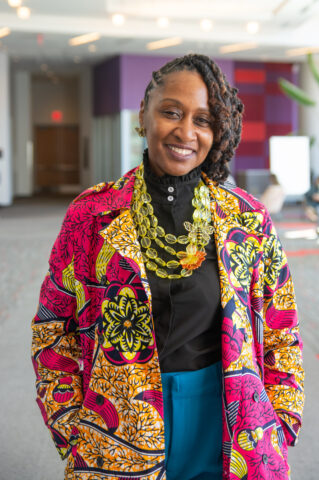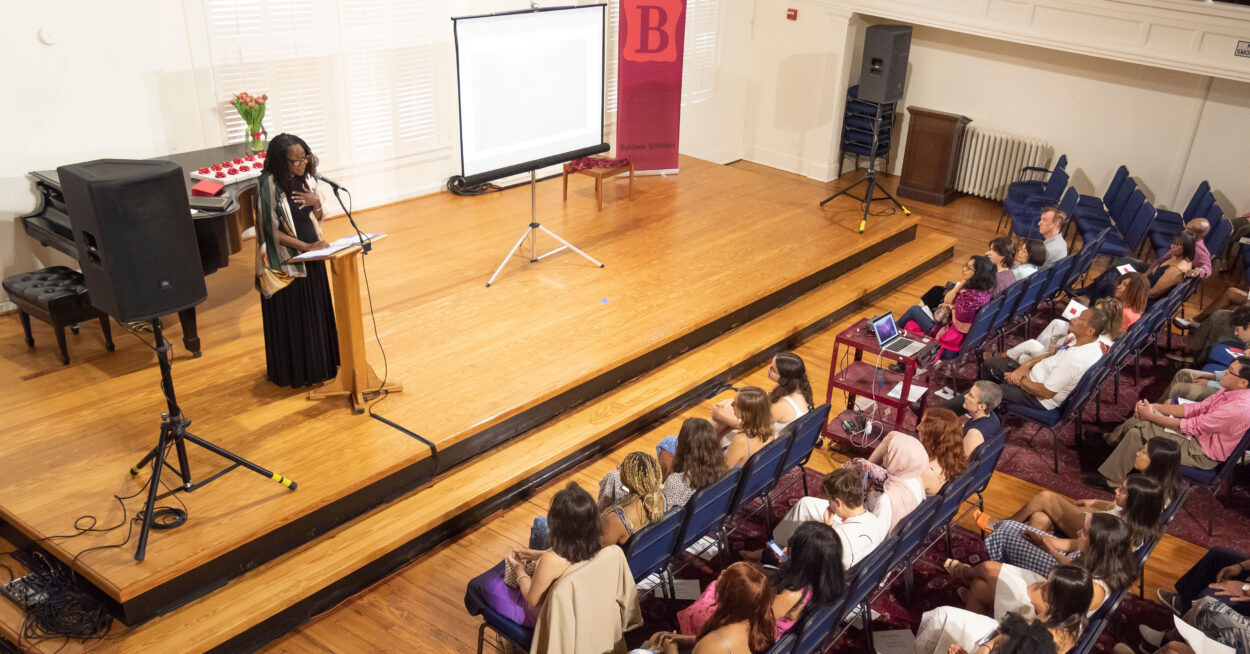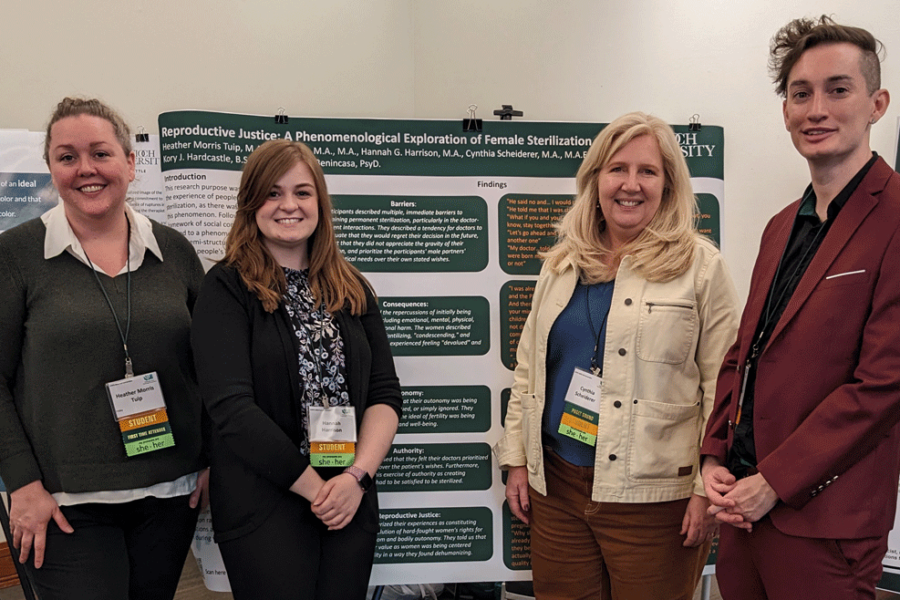Antioch has hired Stephanie Helms Pickett to be its first ever Head of Equity, Diversity, Inclusion, and Belonging. This key position answers directly to the Chancellor, is a member of the Cabinet, and works closely with the Board of Governors, deans, students, staff, and faculty to advance social, economic, racial and environmental justice, and to foster a more equitable and inclusive community. Helms Pickett, who uses the pronouns she/her, started in this new role at the end of January, and she comes to the job with extensive experience and a clear vision for how she can impact Antioch University. On one of her first days on the job, I asked Helms Pickett a few question about what brought her to Antioch and how she hopes to contribute.
When we spoke over Zoom, Helms Pickett was in her home office in Raleigh, North Carolina. After growing up in Chicago, she has lived in North Carolina for the last thirty years, and she has a strong community there. Her previous position was at North Carolina State University, where she served as Associate Vice Provost in the Office for Institutional Equity & Diversity. Faith is an important part of Helms Pickett’s life, and she has published several books including, most recently, This Book Right Here: A 40-Week Devotional to Manifesting Your Purpose. She is also adjunct faculty at Duke Divinity School, where this term she is teaching the course, “Communication: Inspiring and Guiding Change.” For this conversation, though, we stayed focused on Antioch University and her new role here.
Jasper Nighthawk: What about Antioch University do you find most compelling and intriguing?
Stephanie Helms Pickett: Think about this institution: founded 172 years ago with the intention to be involved in work where justice was at the heart, where change and evolution were foundational principles. I can’t even fully comprehend the timing and what was happening in the world at that time. Particularly thinking about the United States, for someone to be bold enough and say, ‘This is something that we are going to commit ourselves to doing’—and you see it still as a theme and a strand all of these years later.

I believe that DEI has never been fully embraced—but there were many things that happened within our country that created space for people to be very defiant and very bold in their resistance. It’s been a hard couple of years in terms of this work. Personally, I was at a crossroads: do I continue with this work or do I do something more palatable that reflects more professional development and wellness? And those things are good, but there is a piece of me that just still was like, ‘I’ve been in this fight. I signed up for it. And I’m here for the long haul.’ So the opportunity to come to a place that—it’s not perfect, it’s got some work to do—but there are certain things that I don’t have to fight coming in the door. Like: I can say social justice. I can say DEI. In many places within higher education, those words are not even permitted to be used.
Antioch feels like a place that is listening and being responsive to what is happening outside of our ivory towers, so to speak. We are looking to actually equip people with the tools and resources to do the work, even as they are enrolled—rather than you’ve got to wait four or five years till you graduate before we bless you to go out and do it. Antioch is saying, ‘Be responsible and be responsive to the ills that are happening around us, and we’re going to support you in doing it through our curriculum, through our experiences, through the people that we hire.’ All of those considerations just continue to paint a picture that felt very compelling for me in a place where, if I’m doing this work, I feel like I can take a breath.
Jasper: I love that. And thank you for being open about your concern that maybe you were going to leave the field of DEI work. Though I’m sure you would have been of use elsewhere too.
Stephanie: Well, you can find something to do. But is that my passion? Not so much. So this was great. It’s been an indescribable opportunity, if I’m fully honest. It really just encompassed so many things that I hope for. And I didn’t have to move, so there’s safety in me doing this work in a place where I already have community and affirmation. I can do hard work and know that I’m not moving someplace where I’ve got to create the community that I need. I have it. And then I get to have the extended community of being a part of Antioch.
Jasper: You’re the first person in this role of Head of Equity, Diversity, Inclusion, and Belonging. It hasn’t existed at Antioch University before. What are your hopes and aspirations for this position, as you invent it out of whole cloth?
Stephanie: It’s exciting, and it’s actually how I like to work. I think this is my seventh or eighth position that I’ve been the first person in. I like to build. I love to spend some time doing some groundswelling to hear voices, make connections, look for gaps, look for consistencies or inconsistencies, and build a framework from that. Then hopefully take it to even more sophisticated places. If and when it’s time for me to exit, then I’ve left something that someone else can pick up and take even higher and expand even more.
It’s a little nerve-wracking. I’m going through the documents now, and I see, ‘HEDIB, HEDIB, HEDIB, HEDIB.’ I’m like, ‘Who is that person?’ ‘Oh, that’s you.’ And it’s in everything. Like, ‘When we’re going to do this, HEDIB will be helpful with this’ or ‘this will be in their office.’ It’s a big lift. But it’s pretty exciting to not have to fall into the trap that we have in higher ed of, ‘Well, so-and-so did it this way, and it has to be done that way.’ It’s wide open. There isn’t that statute that exists already. I get to build that.
And I’m not building that by myself. I’m building that in collaboration. I’m plugging into what already exists. Maybe enhancing, but certainly there is a great foundation of opportunities and experiences that already exist. I get to maybe amplify them even more.
Jasper: This might overlap with what you just said, but I’m curious what contributions you see yourself making as one of the leaders of Antioch.
Stephanie: I really don’t want to operate in a silo capacity. I don’t want to think narrowly. Equity, diversity, inclusion, and belonging should be a thread that is woven through everything that we do. My hope is that while I have the positional title, everybody that works at the institution, everyone that attends the institution has a stake in this work. I may be the drum major for justice, but there is a whole group of people that I am counting on and, quite frankly, expecting to step up.
Everything that we do, we should be asking, ‘Is this equitable?’ We should be asking, ‘How will this impact those that may already feel disenfranchised?’ ‘How will this amplify us being an anti-racist institution?’ I should not be the only one that’s asking that question. I hope in terms of leadership that this work continues to drive the decisions, the strategic goals, and the very essence of what our Chancellor and other individuals that are on the Cabinet are doing. I hope that we collectively hold this work in such an intention that it’s not apparent that we have a Head of Equity, Diversity, Inclusion and Belonging. We have it, but people could be like, ‘Oh yeah, I forgot that person is there because we’re all deeply committed to this work.’ Right?
Jasper: I think your dream will come true, but also you’ll have to resist a little bit the way people can be like, ‘Oh great, you’re here. We’ll make you the one who does it.’
Stephanie: Right. Because people feel like, ‘Oh good. You’re here. We can sit down. It’s going to happen.’ I’m coming from a place where I had four other people in addition to me to do the work. I’m very cognizant of that. The cadence of it and the need to have buy-in are not just my responsibility.
Jasper: What do you hope to learn in this role?
Stephanie: That’s a good question, that’s a really good question. I hope to learn more and have more examples of people really walking out humanity in a way that is beautifully surprising. I think there’s so many wonderful things that are happening. I hope that I can learn more about what is happening that counters what takes up, sometimes, the most space. There’s so much space and attention given to resistance. How do we tell a narrative that rejects that? I hope to learn more about what is happening not only at Antioch but at other institutions that we are akin to—foundations, organizations—and just to be able to paint a very different picture than what we see on the six o’clock news. I want to be able to share those things and look at this work very differently.
Jasper: I love how you’re not wanting to just be a cookie cutter of, ‘Here’s what DEI means at a university.’ Instead you’re trying to find your own path.
Stephanie: So much has happened here already that we have an incredible opportunity to amplify what’s already underway. Right now we’re still very much in a, ‘We’re going to have a training, you’re going to learn this, and we don’t know if you implement it or not’ mindset. But I think Antioch is doing some really unique things in terms of advancing this work, and I think there’s more that we can obviously do to set ourselves as an exemplar. If we’re able to do it, given the structure that we have, anybody that’s down the street at a traditional brick and mortar institution has no excuse, right? So I’m excited about that.
Jasper: Throughout Antioch’s history it has had a lot of periods where it was a leader in higher education, helping to come up with models that now are like widely adopted. I totally see your work fitting into that.
Stephanie: This should be no different. No pressure, no pressure, Stephanie!
Jasper: I know, zero pressure! My last question is, if I was going to do this interview five years from now, what would you want to be able to say about Antioch University more widely and about your service as the Head of Equity, Diversity, Inclusion, and Belonging?
Stephanie: I would believe that our Center for Truth, Racial Healing, and Transformation is a model compared to other institutions. I would hope that individuals are coming to us to learn of what we’ve done and how they can replicate that. And I certainly would want our numbers in our student population and our faculty and staff to reflect a more balanced approach, both in terms of demographics across the United States and the world but also reflective within our university, so that we can see and have representation of various identities in a more balanced way.
I would additionally like to see us tell our story more. How do we tell our story more to get it out there? How do we position ourselves so that people know the good things that are happening here? I think it’s interesting coming from the outside, so to speak. Y’all have this really good, sweet secret that you know about, and you’re thriving in it, and it’s great. And maybe the average person going through wouldn’t know about it. Is that intentional? Is that who we want to be? Or as we are talking about being of service to humanity and being responsive and having these tenets, should that be something that is more widely known? This is me speaking on my second day, so you could push back on all of that. But in five years, how might Antioch become a common name without sacrificing the intentionality of who we are? Not selling ourselves out or selling ourselves short but maintaining that integrity so that people know who we are and know what to expect as they engage with us.
In terms of leadership, I again think: how does this become so ingrained in everyone that’s a part of leadership, that it’s not just the responsibility of this office that I hold. And how are we seeing a return on our investment? I hope we’re still tackling difficult problems and being bold enough to sit with them, sometimes sit in silence, before we determine the best method to move forward. I hope we remain bold.



